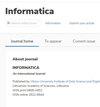Advancing Research Reproducibility in Machine Learning through Blockchain Technology
IF 2.8
4区 计算机科学
Q2 COMPUTER SCIENCE, INFORMATION SYSTEMS
引用次数: 0
Abstract
Like other disciplines, machine learning is currently facing a reproducibility crisis that hinders the advancement of scientific research. Researchers face difficulties reproducing key results due to the lack of critical details, including the disconnection between publications and associated models, data, parameter settings, and experimental results. To promote transparency and trust in research, solutions that improve the accessibility of models and data, facilitate experiment tracking, and allow audit of experimental results are needed. Blockchain technology, characterized by its decentralization, data immutability, cryptographic hash functions, consensus algorithms, robust security measures, access control mechanisms, and innovative smart contracts, offers a compelling pathway for the development of such solutions. To address the reproducibility challenges in machine learning, we present a novel concept of a blockchain-based platform that operates on a peer-to-peer network. This network comprises organizations and researchers actively engaged in machine learning research, seamlessly integrating various machine learning research and development frameworks. To validate the viability of our proposed concept, we implemented a blockchain network using the Hyperledger Fabric infrastructure and conducted experimental simulations in several scenarios to thoroughly evaluate its effectiveness. By fostering transparency and facilitating collaboration, our proposed platform has the potential to significantly improve reproducible research in machine learning and can be adapted to other domains within artificial intelligence. PDF XML通过区块链技术提高机器学习研究的可重复性
与其他学科一样,机器学习目前也面临着可重复性危机,这阻碍了科学研究的发展。由于缺乏关键细节,包括出版物与相关模型、数据、参数设置和实验结果之间的脱节,研究人员在重现关键成果时面临重重困难。为了提高研究的透明度和信任度,需要有能提高模型和数据可访问性、促进实验跟踪并允许对实验结果进行审计的解决方案。区块链技术具有去中心化、数据不变性、加密哈希函数、共识算法、强大的安全措施、访问控制机制和创新的智能合约等特点,为开发此类解决方案提供了令人信服的途径。为了应对机器学习中的可重复性挑战,我们提出了一个基于区块链平台的新概念,该平台在点对点网络上运行。该网络由积极从事机器学习研究的组织和研究人员组成,无缝集成了各种机器学习研究和开发框架。为了验证我们提出的概念的可行性,我们使用 Hyperledger Fabric 基础设施实施了一个区块链网络,并在多个场景中进行了实验模拟,以全面评估其有效性。通过提高透明度和促进合作,我们提出的平台有望显著提高机器学习研究的可重复性,并可适用于人工智能的其他领域。
本文章由计算机程序翻译,如有差异,请以英文原文为准。
求助全文
约1分钟内获得全文
求助全文
来源期刊

Informatica
工程技术-计算机:信息系统
CiteScore
5.90
自引率
6.90%
发文量
19
审稿时长
12 months
期刊介绍:
The quarterly journal Informatica provides an international forum for high-quality original research and publishes papers on mathematical simulation and optimization, recognition and control, programming theory and systems, automation systems and elements. Informatica provides a multidisciplinary forum for scientists and engineers involved in research and design including experts who implement and manage information systems applications.
 求助内容:
求助内容: 应助结果提醒方式:
应助结果提醒方式:


